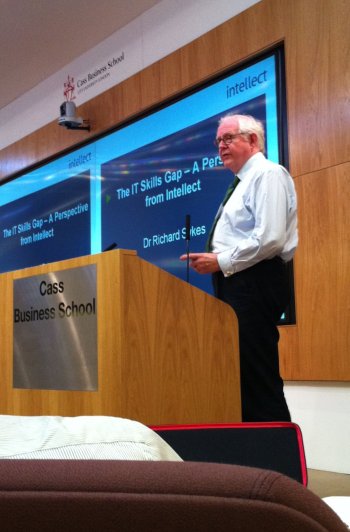Will limits on overseas tech workers hurt UK plc?

Experts warn government policy could damage competitiveness...
The government's policy on immigration risks damaging the competitiveness of UK businesses by restricting the flow of skilled technology professionals, business leaders have warned.
Dr Richard Sykes, chair of the Outsourcing Group at tech trade body Intellect, said while the UK is still a net exporter of technology skills, the competitiveness of UK plc is being put at risk by government policy targeting migration by capping the number of non-EU skilled migrants who can work in the UK.

"We should have an absolute policy for qualified professionals of absolutely open borders," says Dr Richard SykesPhoto: Natasha Lomas/silicon.com
Speaking at a conference on IT skills held at City University's Cass Business School, Sykes said: "How do we maintain that competitiveness unless we keep very open borders to the free movement of the professional?"
He added: "Of very great concern on my side is that the current efforts of this government to make it more and more difficult and restrictive [for skilled migrants to work in the UK] is not a good thing."
"We should have an absolute policy for qualified professionals of absolutely open borders because that's the nature of the UK economy," added Sykes.
Sykes described the UK as a "prime location for offshoring" - citing OECD statistics showing that when it comes to technology services the UK exports three times as much as it imports. "We run a massive balance of trade surplus in technology services," he noted. "A lot more of the world offshores to the UK than the UK offshores to other parts of the world such as India."
How the UK maintains that global competitiveness in the face of an anti-immigration political ideology "is a very key question", he added.
The government's cap on skilled non-EU migrants came into force back in April, one of a range of measures aiming to reduce net migration to the UK from hundreds of thousands per year to tens of thousands. Other migration reduction measures being looked at by the government include cutting the number of students coming to the UK, family reunion/marriages, and settlement rights for skilled migrants.
Guy Bailey, principal policy adviser at the CBI, told silicon.com the UK business association has seen evidence from its members that the migration cap is having an impact on how they do business. "There's already some evidence that firms are starting to change their activities to account for the fact that it will be more difficult to bring non-European Economic Area workers into the UK in the future," he said. "Certainly we're seeing parts of businesses moving overseas, we're seeing graduate schemes being dispersed to other global hubs.
"We're seeing perhaps certain teams within broader teams moving from the UK where they were headquartered - perhaps to be near to the city or to be near to the creative industries - being moved to other parts of the world where perhaps also a lot of their work is based. And obviously in the longer term interest of the UK economy and the need to generate growth it's a worry that those strands of evidence we're starting to see at the moment start to build towards a critical mass."
"The perception is the biggest problem right now," he added. "There is a perception from businesses and from those looking to invest in the UK that the government is looking to make it very difficult to bring skilled workers into the UK."
While Bailey said the government has shown "welcome flexibility" in setting the level of the annually reviewed cap in its first year, by taking the advice of the Migration Advisory Committee (MIG) and excluding intra-company transfers from the limit - an established route into the UK for foreign IT workers, he said there is likely to be political pressure to reduce the level of the cap in the future.
"The clear challenge for the government is to make sure the rhetoric matches up to the reality," he added. "They need to give businesses the confidence that the workers they need to bring to the UK they will be able to do so in the future."
Bailey said the fact of having a cap should not itself be of concern to UK plc - so long as the government is sensitive in how it sets the level each year.
"If a cap is set at a sensible level, if the government pays attention to the advice of the MIG every year, if they take account of the fact that as the economy grows it's quite possible that the need for skilled labour which we can't access in the UK will rise rather than fall, then the cap is very far from an insurmountable barrier," he said.
"If the government wants to generate growth they have to take a whole set of steps to make the UK the most attractive place to invest and mobility - migration - is a very important part of that, but it's not the only part of it," Bailey added.
"They need to make sure the infrastructure in the UK is right, they need to make sure the taxation system is correct and there's a whole stream of areas where the government needs to make sure the UK is set up to attract investment rather than lose out to international competitors."
At the time of publication, the Home Office had not responded to a request for comment.